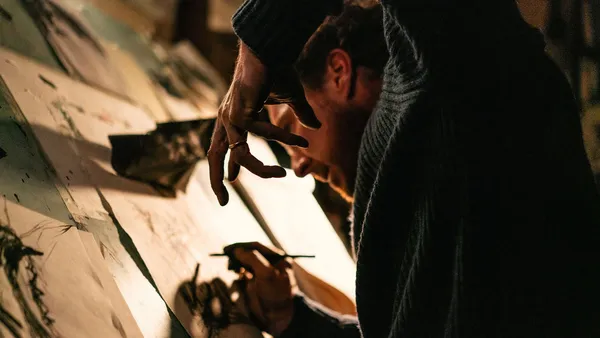Eye For Film >> Movies >> The Thing With Feathers (2025) Film Review
The Thing With Feathers
Reviewed by: Jeremy Mathews

Depression is a notoriously difficult subject to capture in a film. Of course, anyone can point a camera at someone moping on their couch, but turning feelings of despair in to a dynamic, continually compelling narrative is another story. Which is likely why Dylan Southern’s The Thing With Feathers attempts to manifest the grieving process via psychological horror.
The result is a sometimes compelling, often baffling work that doesn’t really solve the inherent problem of its subject matter, but swings for the fences trying. It also serves as a showcase for the talents of Benedict Cumberbatch, who plays a dad grieving the loss of his wife while also stumbling his way through single-fatherhood in a haze of alcohol, hopelessness and feelings of impotence. Oh yeah, and a weird giant crow thing is haunting him.
The work is adapted from Max Porter’s novella Grief Is The ThIng With Feathers, which is in itself a reference to Emily Dickinson’s poem about hope. The shortening of the title brings more of the attention to the thing itself, an intimidating hulking figure with wings, black feathers and a big crow head. Voiced by David Thewlis with gruff, somewhat hard to understand panache, Crow does not have clearly defined motives or purpose, but he haunts the family’s days, and mocks Dad over his mopery, repeatedly insulting him with epithets like “sad dad” and “English widower”.
Dad is a graphic novelist, but since his wife died, he’s been soaking his pages in black ink to create dark drawings of Crow. (The novella’s Dad was writing a book about Ted Hughes, famous for his crow poems, but cinematically the illustrations prove key to the visual portrait of Dad’s psyche.) His scribbling helps distract him from his feelings of inadequacy about raising his boys (Richard and Henry Boxall), when his wife was always better equipped to get the job done.
Section titles, taken from the book, divide the film into parts about Dad, the boys and Crow. However, these sections don’t really feature the sort of perspective switch that they imply. We might briefly get a sense of one character more strongly than another, but not enough to justify the divisions. Likewise, a couple horror-centric set pieces – one based in a grocery store and the other introducing a demon with more sinister motives than Crow – are well-executed stylistically, but fail to give the film a much-needed propulsion.
On one hand, watching the film try all these tricks while still coming off stagnant and one-note prompts the thought, “Well of course they’re trying all this – they can’t get it to work.” On the other, you look at Cumberbatch and see a performance that could have gone down as a career best. In the right moments, he conveys a sense of great clarity of emotion with each facial expression. And that prompts a different thought: “With a performance this good, shouldn’t it hit a higher level?”
Perhaps it all comes down to the film’s failure to define Crow’s relationship with Dad and the boys. Mystery is good, as are lingering questions. But here everything is so vague that it doesn’t give the audience a chance to ask questions, let alone for those questions to build with haunting echoes. Instead we’re left with a belabored metaphor in search of a purpose.
Reviewed on: 27 Feb 2025
















